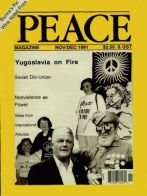
Peace Magazine Nov-Dec 1991, page 14. Some rights reserved.
Search for other articles by Julia Kalinina here
On the next page is a series of excerpts from a letter by Julia, received by our editor soon after the coup in the USSR. Julia is an activist who is married to Sasha Kalinin, a member of the Moscow city council. Their history of political activism put them both in danger when the reactionary leaders took power. They took an active role in resisting the coup.
We thought you might like to hear some of her observations from that turbulent time.
Dear Metta,
The most interesting question was when arrests would begin. I supposed that we had something like three hours so we discussed if it were possible to hide the most evident compromising material. After a short discussion we decided that there was no sense hiding it because everything would be compromising...
The only way to resist was civil disobedience. However during the day I had heard many conversations in the streets to the effect that the democrats had spoiled the country and at last we would have real order and food and CKChP(the coup group's acronym) promised to increase pensions and reduce prices-it seemed to me that most of the people were really glad to get rid of Gorbachev, democrats, market relations, national conflicts splitting the country-all the problems of our last years. They wanted to live as they used to live. If so, civil disobedience wouldn't be possible. People would be happy if they had an opportunity to buy cheap sausage and vodka and that would be enough for several years. I had no hopes concerning the future of my family...
People were talking to soldiers, children were climbing tanks. Soldiers looked peaceful, they were eating ice cream and eagerly responded to questions...Later Sasha explained that the headquarters were changing sub-units as often as possible because the soldiers were being persuaded by the citizens...Sasha found out that the soldiers had no idea what was happening. Some of the soldiers told him that they were awakened early in the morning, and their commander explained that American troops had landed in Moscow that night, so it was absolutely necessary to move to Moscow to protect Yeltsin...
In the evening we went back to the White House. The situation was very strained. All the stairs and driveways to the building were blocked with high barricades and peoples chains and they didn't let women go inside. These brave men said that women should go home or stay outside the terrace, which was stupid because crowds of unarmed women would be the most effective protection, much better than crowds of unarmed men. We managed to deceive them and got inside. Most of the people were organized in teams there, every team had its task (to defend a particular entrance), and were provided with gas masks and were busy gathering stones, heavy sticks and empty bottles (to fill with gasoline)...
The defenders had great amounts of food because people, especially women, who couldn't stay for the whole night were bringing food. The most inconvenient thing was the absence of washrooms-maybe it was the main reason for them to refuse the women's help...
We heard the first shots at 12:10, standing in a human chain on the parapet of the White House in the end of Kalinin Prospect. The tragedy happened just about 200 meters away but we couldn't see it and we didn't know anything, we only heard the shots and burst of gunfire and say the flashes. Most of the people didn't move from their place but some ran to take out food like rolls and cookies and ate it and offered food to each other and chewed feverishly...
On the way home in the subway we saw rested, dressed up people going to their offices. the had a fresh look and watched us, absolutely wet, dirty and tired, with disapproval...
There was no news about arrests but that didn't really encourage me. I supposed that they would do everything later when the soviet people and foreign countries got used to the new Soviet government...
I heard an official report on the night's events: a group of criminals had attacked a peaceful tank that night so there were victims and those extremists who were guilty would be found and punished...
We went to distribute leaflets and I was absolutely sleepy. When we got back home at 5:30 my father phoned us and said "they are finished." I switched on the radio and heard that exciting news and at last believed that everything was over...
.Assuredly, the defence was an example of nonviolent resistance, but I didn't see any signs of a theoretical basis to it... many people don't realize even now that the victory was ensured by the absence of arms, by the peacful nature of the resistance. I infer that we still have to work on disseminating nonviolent ideas.
What is going on now is not encouraging but pretty desperate. It seems that the new leaders are eager to have everything that the old ones had and even more. Instead of the communist guidance we shall have new authoritarian structures with the same methods of censorship and elimination of the opposition.
Though sometimes I feel that I'm fed up with it, I don't want to change my life for another one.
See you soon and best wishes,
Julia.

Peace Magazine Nov-Dec 1991, page 14. Some rights reserved.
Search for other articles by Julia Kalinina here